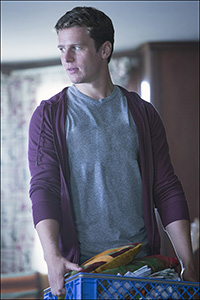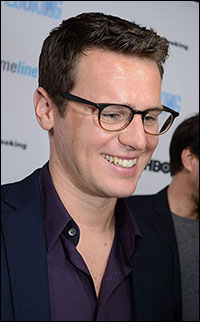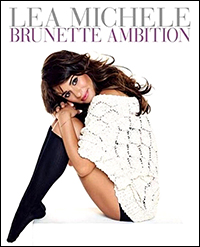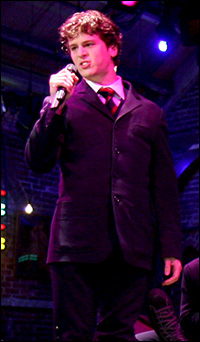
*
Although Jonathan Groff was playing the radical Melchior Gabor in the Tony Award-winning, pulsating rock musical Spring Awakening — a character that marched to the beat of his own drum and fought hard for his beliefs — Groff himself was remaining closeted, a quality that, he said, left him feeling "shut down." Following a Tony nomination and rise to stardom within the theatre community, Groff found comfort and acceptance within himself.
As an openly gay actor, who has become a household name via the success of Fox's hit musical series "Glee" and the megahit, Oscar-winning film "Frozen," he acts as a role model for adolescent artists — teaching master classes and workshops and visiting elementary schools to educate and share his passion for the arts. Groff, who recently performed at this year's gala for The Public Theater — in which he sang "I Can Do That" from A Chorus Line, one of his favorite musicals — has taken a theatrical hiatus and has focused his efforts in the worlds of film and television. He stars as Patrick Murray, an openly gay video game designer getting caught up in the games of 21st-century dating on HBO's "Looking"; and Craig Donner, who dies from AIDS, in the film adaptation of Larry Kramer's groundbreaking, Tony-winning drama The Normal Heart.
In celebration of #PlaybillPride, Groff spoke with Playbill.com about his recent projects, working with Kramer, his coming-out story, Lea Michele and his favorite art form, theatre.
With "Looking" and "The Normal Heart," you seem to be passionately involved in important gay-themed works. What attracts you to these projects?
JG: Well, it's interesting because I feel like the political message [of] these projects has been a great bonus for me. With "Looking," I was a huge fan of the movie "Weekend" [written and directed by Andrew Haigh, who is a producer on "Looking"], and I felt like Andrew Haigh had captured the gay experience in that movie in a way that I'd never seen before. It felt really relatable to me, so I knew I wanted to be a part of ["Looking"] because I so admired his movie and because there hasn't been a gay television show since "Queer as Folk." And, [with] "The Normal Heart," I'd seen the play at The Public — the revival with Raúl Esparza that was great ten years ago — and then I saw the [2011 Broadway revival] with Joe Mantello that blew my mind and left me in a puddle, so I would have done anything to be a part of that story just because it's so legendary. And, to get to meet Larry Kramer — he was there on set — it was a really amazing experience, and I just feel so proud to have such a personal [connection]… It means so much more. I love acting, and I've done a variety of things, but it does mean so much more when you feel that personal connection to the work, and certainly "Looking" and "The Normal Heart" — being gay-themed projects — mean even more to me because I feel like I have a personal stake in them.
| |
 |
|
| Groff on "Looking." | ||
| HBO |
JG: He was amazing. The most vivid memory I have from the set is that he came when we were shooting the White Party on the beach in Fire Island, and he had to leave. He just broke down, and he got really emotional and left because that scene is not in the play, so I think it kind of came as unexpected to him — to be there on Fire Island on the beach, where they did have the White Party—and to look around and say, "So many of these people died, and I was at this party, and so many of them are gone." It was a real revelation to all us twentysomethings who were standing there on the beach having a good time.
I feel like we're in a really interesting spot in the gay community because there's such a wave of acceptance that's happened over the last five years — over the last ten years, but a lot in the last five years… There's a huge shift. I was born in 1985, and I'm having such a different experience as a gay man than the people who were in their prime in 1985. Being on set, doing "The Normal Heart" with a bunch of people in their 20s that day on the beach, was a real revelation for all of us — just to be reminded what it was like to live not that long ago and to be a part of that generation and to be reminded of what they struggled through, what they fought through and what they gave to us.
Talk to me a bit about "Looking." What excites you about next season? What can you tease?
JG: Well, I know all of the stuff that everybody knows — both Russell Tovey [who plays Kevin, Patrick's boss who he hooks up with in the season finale], Raúl Castillo [who plays Richie, Patrick's love interest] and Lauren Weedman [who plays Doris] have signed on as season regulars as opposed to guest stars, so we'll be seeing more of them. The stories they have brewing [for next season] are really exciting and surprising, and I'm so excited to get back to that show. A lot of the actors — almost all of us, actually — live in New York, so we have stayed friends and stayed connected. It's a very unique, very special experience. I'm going to Fire Island with them today!
I'm so jealous!
JG: You can work from Fire Island, right? [Laughs.]
What is your favorite part about Patrick? What do you admire about him?
JG: My favorite part about Patrick is that he — from the very first scene of the very first episode, when he tries to get a hand job in Golden Gate Park — you're seeing a character who is ready to step outside of his comfort zone and grow. I feel like Patrick is naïve in a lot of ways, and he has a lot of learning and a lot of growing up to do, but the thing that I admire most about him is that, right when we first meet him, he's starting that journey. And, just when he's about to start really "looking" [laughs] at himself and try to go deeper — trying to learn more and trying to ask himself those hard questions, [such as when] he asks Dom in the pilot, "Why do I keep on going on bad dates?" — he's ready to break those bad patterns in his life and try something new. That's what I really admire about him, and it's so fun to play that because it's someone who is stepping outside of his comfort zone, which is really satisfying, emotionally, because [they're] always on edge, and there is also the potential for comedy in those moments because any time we step outside of our comfort zone, we're bound to fall on our face a couple of times or more.
| |
 |
|
| Groff at the San Francisco premiere of "Looking." |
JG: Yeah, I feel like the whole element of the show that I was interested in is that the characters are gay, but none of them are struggling with their sexuality. It's definitely 2013-14 on this TV show. Like you said, there's online dating. I just went to a wedding last week of a friend of mine, who met her husband on the Internet. It's online dating, it's Grindr, it's all of that — and it's a group of men whose biggest problems in their life are not them grappling with the fact that they're gay, which is very specific to our generation… I grew up in world that had "Will & Grace," and that was a huge deal, and I remember in eighth grade seeing the poster for that show and being like, "Huh! Okay… Interesting." It's become more normalized, and we're growing up in a world where gay men and women can get married. ["Looking"] wasn't a bunch of coming-out stories, it wasn't people who were devastated by the fact that they were gay. Certainly, it's a huge part of the show, and it's hopefully truthful and specific to the gay experience, but it's people dealing with relationships and work and love and friendship and all this stuff that anybody goes through as we get more comfortable — as the world gets more comfortable — with the gay experience.
Last night I was with a friend, and she was saying you were teaching a class in the city not too long ago. And, what really inspired me was that she told me a child came up to you to ask you questions about being an out actor. There are children who look to you as a role model — you've been in movies such as "Frozen" and done roles such as Melchoir, but also gay-themed work. What makes you proud to know that up-and-coming artists look up to you like this?
JG: I remember that moment. It was really moving and makes me emotional just hearing you say that story back to me. It was so sweet and moving when that little boy came up to me. It means a lot, for sure, to have a kid like that or other kids that want to do these workshops or classes say that it means something to them… I remember the few actors who were out [when I was younger] and looking into them and thinking, "Okay…" Coming from Lancaster, PA, I didn't have a lot of gay role models because it's a very conservative community, and the people who were gay when I was growing up were pretty closeted, but one of the great things that I still value and really valued back then was that I met a lot of gay people working in the theatre, and it was just so comforting to know that you could be gay and have a life… So the fact that if I'm an out actor, and kids can have that same sort of release and experience, it's incredibly meaningful.
| |
 |
|
JG: Well, it's interesting because when I was in Spring Awakening, I wasn't out to anyone in my life. I was completely 100-percent closeted, except for my roommate at the time, who was my "roommate" in quotations — my boyfriend-roommate… We lived together for years, and when I was in Spring Awakening, I never, ever talked about it, and everybody was so sweet. All of my castmates were so respectful and must have just intuited that I didn't want to talk about it because no one ever grilled me or asked me. They just knew I wasn't ready, which was so generous, and I appreciate them for that — letting me come to it on my own and have my own journey with that. And, it's interesting… When I was closeted, I never realized how shut down I was until I came out.
It's so interesting! Doing Spring Awakening was such an incredible, expressive, wonderful experience, and in the show, I played this character who — my motto for him that I put on my dressing room mirror was, "Don't let the world define you." That was my quote that I felt was very Melchior — I would always hold [it] with me… I told this to Michael Mayer a year after I left the show, once I came out — I came out right when I left the show: I'd been playing Melchior, and Melchior was a character that I really didn't relate to in my real life. He felt very far for me, but getting to do that role eight times a week really cultivated this aspect of my personality that was this idea of, "Don't let the world define you." I was getting to express that quality and work on that quality and live in that quality every night in the play, and then when I left the show, I couldn't put it in the play anymore, and I had to put it in my life. I had this whole side of myself that I discovered — that I was sort of channeling in the character — and when I didn't have the character to channel that energy into anymore, I was like, "Okay, I have to include this in my life now and take this on as me," and a month after I left the show, I came out to Lea and to my friends and my family, and in retrospect, when I look back now and I think about what it was like to be closeted, I think, "The release and relief and just the way that life gets better after you stop living a compartmentalized existence is major and is something you can't really understand until you finally take that leap." So, yeah, I feel like Spring Awakening, in retrospect, helped me get there. I didn't realize how closed off [I was], and I was not living my fullest life until I finally came out.
| |
 |
|
| Groff in Spring Awakening. | ||
| Photo by Joan Marcus |
JG: Oh my God, it was great! I was so proud of her. I'm so proud of her — she's a New York Times best-selling author! She never stops. She never ceases to amaze me. She never stops going. She's a total workhorse. I'm so inspired by her. We did a Q&A at Barnes & Noble, where I interviewed her for publicity for the book, and there was a line through the entire store to wait to see her and get her to sign her books. It was such a great moment to have been in New York with her doing [Spring Awakening] and to now be back in New York with her, and she's got this whole thing going on. It's amazing.
What kind of dream roles do you have? Would you want to see a Jon Groff/Lea Michele reunion on stage? What can we get you back to Broadway with?
JG: Yes, I'm dying to do something with her again. That would be a blast. I've never been a dream role person. My whole life, I've never had the list of things to [check] off, but I can say that I am dying to get back on stage. I really am. I've seen almost every show from this season. Every time I come back to New York — and I'm here for the summer — I see everything. Theatre is my true, great obsession. I'm a fan first before I'm an actor in the theatre. I see everything. I love it, and doing these… I did this Rodgers & Hammerstein [concert, Getting to Know You] at the 92nd Street Y in April with Ted Chapin and the [gala] for the Public last night… I'm really hoping that I get to come back sometime soon. I love it.
What did you enjoy most about this season?
JG: That's a good question. I have to say, I had never seen A Raisin in the Sun before — oh my God — and I was just so knocked out by that play. I mean, it was a revelation for me only because I also never had seen the play or read the play before… I feel like, usually, in a great play, there's a line or a scene that sort of changes you — you leave slightly changed from the line or the scene or the moment or the performance — and the entire play of Raisin in the Sun is scene after scene of moments and life-altering exchanges between characters… I am blown away by it. I just can't believe that Lorraine Hansberry wrote that when she was 28. I'm just astounded. It made me want to have kids, that play. [Walter Lee Younger is] forced to be the better man for the generation that's behind him — it's so moving to me. It's so incredibly moving, and it's that way with "The Normal Heart," too. As a gay man of a younger generation, I'm reminded of how they were igniting — and certainly it was life and death for them… They paved the way for us in such an important, very deep, very meaningful way. Hopefully one of the goals for "The Normal Heart" is for my generation — our generation — to be watching and say, "Now what do we do? How can we help the people behind us to make it even better for them than it is for us today?"
(Playbill.com staff writer Michael Gioia's work appears in the news, feature and video sections of Playbill.com as well as in the pages of Playbill magazine. Follow him on Twitter at @PlaybillMichael).









